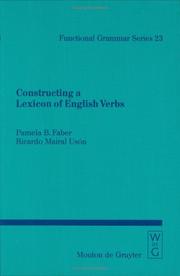| Listing 1 - 9 of 9 |
Sort by
|
Book
ISSN: 18614078 ISBN: 1283628430 9786613940889 3110277204 9783110277203 9783110277203 9781283628433 9783110275568 3110275562 6613940887 Year: 2012 Volume: 20 Publisher: Berlin Boston
Abstract | Keywords | Export | Availability | Bookmark
 Loading...
Loading...Choose an application
- Reference Manager
- EndNote
- RefWorks (Direct export to RefWorks)
This book explores the importance of Cognitive Linguistics for specialized language within the context of Frame-based Terminology (FBT). FBT uses aspects of Frame Semantics, coupled with premises from Cognitive Linguistics to structure specialized domains and create non-language-specific knowledge representations. Corpus analysis provides information regarding the syntax, semantics, and pragmatics of specialized knowledge units. Also studied is the role of metaphor and metonymy in specialized texts. The first section explains the purpose and structure of the book. The second section gives an overview of basic concepts, theories, and applications in Terminology and Cognitive Linguistics. The third section explains the Frame-based Terminology approach. The fourth section explores the role of contextual information in specialized knowledge representation as reflected in linguistic contexts and graphical information. The final section highlights the conclusions that can be derived from this study.
Cognitive grammar. --- Sublanguage. --- Language for special purposes --- Restricted language --- Special language --- Discourse analysis --- Language and languages --- Semantics --- Register (Linguistics) --- Cognitive linguistics --- Grammar, Comparative and general --- Psycholinguistics --- Variation --- Cognitive grammar --- Sublanguage --- #KVHA:Cognitieve linguïstiek --- #KVHA:Taalkunde --- #KVHA:Terminologie --- Cognitieve grammatica. --- Terminologieleer. --- Vaktaal. --- Cognitive Linguistics. --- Knowledge Representation. --- Ontology. --- Specialized Language. --- Terminology.
Book
ISBN: 8479332883 Year: 2004 Publisher: Granada : Método,
Abstract | Keywords | Export | Availability | Bookmark
 Loading...
Loading...Choose an application
- Reference Manager
- EndNote
- RefWorks (Direct export to RefWorks)
Book
Abstract | Keywords | Export | Availability | Bookmark
 Loading...
Loading...Choose an application
- Reference Manager
- EndNote
- RefWorks (Direct export to RefWorks)

ISBN: 3110164167 3110800624 Year: 1999 Volume: 23 Publisher: Berlin de Gruyter
Abstract | Keywords | Export | Availability | Bookmark
 Loading...
Loading...Choose an application
- Reference Manager
- EndNote
- RefWorks (Direct export to RefWorks)
Lexicology. Semantics --- English language --- -Lexicology --- Language and languages --- Germanic languages --- Verb --- Lexicology --- Lexicology. --- Verb. --- Conjugation --- Periphrastic verbs --- Verb phrase
Book
ISBN: 902721106X 9027257787 9789027211064 9789027257789 Year: 2022 Publisher: Amsterdam John Benjamins Publishing Company
Abstract | Keywords | Export | Availability | Bookmark
 Loading...
Loading...Choose an application
- Reference Manager
- EndNote
- RefWorks (Direct export to RefWorks)
The aim of this volume is to provide an overview of different theoretical perspectives on Terminology, from Wüster to other initiatives that have emerged since the beginning of the 1990s. The volume also covers important topics which have significantly influenced Terminology and its evolution. These include variation, multidimensionality, conceptual relations, and equivalence, among others. The twenty-two chapters of the volume, all written by acknowledged experts in the field, explore the questions that different approaches seek to answer. They also describe the theoretical and methodological principles that were devised over the years to characterize, analyze, and represent terminological data. The semi-chronological, semi-thematic organization of chapters not only provides readers with a clear vision of the evolution of ideas in Terminology, but also gives them an understanding as to why some of these ideas were initially challenged. In addition to being accessible to readers unfamiliar with the basic theoretical principles in the field, the chapters provide a showcase of current research in the field, the challenges looming on the horizon, and finally future directions in terminological research. By bringing together work that is often disseminated in different forums and written in different languages, this volume provides a unique opportunity to look at how different theoretical approaches to Terminology offer complementary perspectives on terms, concepts and specialized knowledge, and help to further a better understanding of the complex phenomena that terminologists must successfully deal with in their work.
Lexicology. Semantics --- Historical linguistics --- Terms and phrases. --- Terminologie. --- Terms and phrases
Book
ISBN: 9783110800623 Year: 2012 Publisher: Berlin Boston
Abstract | Keywords | Export | Availability | Bookmark
 Loading...
Loading...Choose an application
- Reference Manager
- EndNote
- RefWorks (Direct export to RefWorks)
Book
ISBN: 9788484446323 Year: 2002 Publisher: Granada : Editorial Comares,
Abstract | Keywords | Export | Availability | Bookmark
 Loading...
Loading...Choose an application
- Reference Manager
- EndNote
- RefWorks (Direct export to RefWorks)
Sciences --- Terminologie --- Terminologie. --- Traduction.
Book

ISBN: 9788490424131 Year: 2021 Publisher: Las Palmas de Gran Canaria Universidad de Las Palmas de Gran Canaria
Abstract | Keywords | Export | Availability | Bookmark
 Loading...
Loading...Choose an application
- Reference Manager
- EndNote
- RefWorks (Direct export to RefWorks)
Book

ISBN: 9783111073149 9783111072531 3111073149 Year: 2024 Publisher: Berlin Boston
Abstract | Keywords | Export | Availability | Bookmark
 Loading...
Loading...Choose an application
- Reference Manager
- EndNote
- RefWorks (Direct export to RefWorks)
The book sets out to describe new developments in terminology from a cognitive perspective. It encompasses a wide range of theoretical and practical approaches, covering different areas of knowledge and drawing on interdisciplinary research in corpus linguistics, neology, discourse analysis and translation studies. International scholars present accounts of developments in the interface between terminology and cognitive linguistics.
| Listing 1 - 9 of 9 |
Sort by
|

 Search
Search Feedback
Feedback About UniCat
About UniCat  Help
Help News
News